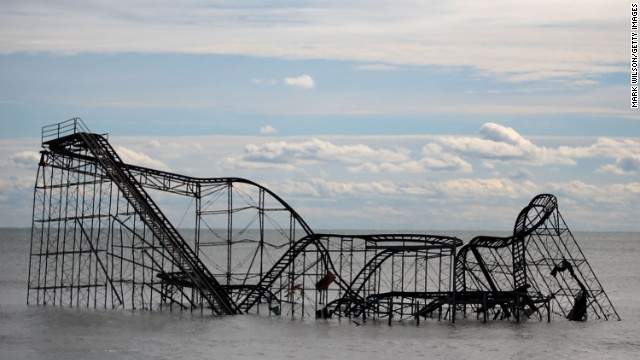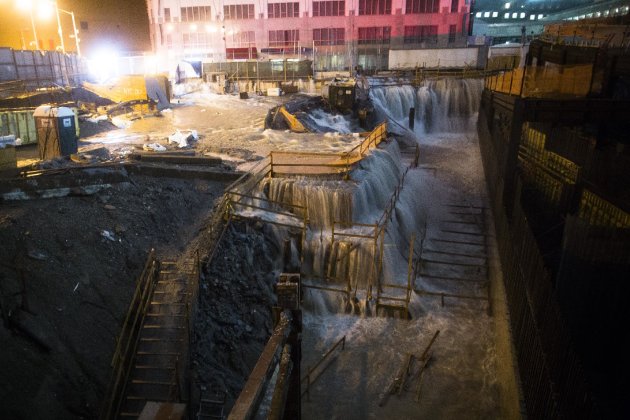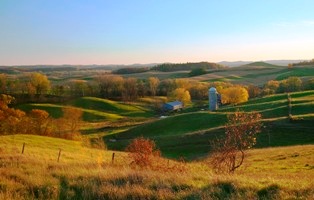Wednesday, December 12, 2012
Recap on 2012 Hurricane Season
The 2012 hurricane season in the United States was listed as above avergage by the NOAA. There were 19 named storms this year, 11 of which matured into hurricanes. The only serious hurricane that formed, Michael, never made landfall and stayed out in the open Atlantic. NOAA reports that while this year was an active year for hurricanes, there have been 10 busier years in the last 30. While the number of hurricanes remains high, this is the seventh straight year that the United States has not been hit by a major hurricane, type 3 or higher. Though there were not major hurricanes that made landfall, probably the most expensive storm in the history of the United States hit New Jersey, New York, and other parts of the east coast. As we've discussed in class, the reason that we've had so many above normal years of hurricane activity is related to warmer waters. The report says that one of the reasons that no major hurricanes made landfall in the United States was due to a persistant jetstream that covered the eastern portion of the United States for much of the hurricane season. NOAA reports that it will release its preseason outlook for 2013 in May. Until then I can hardly wait!
Tuesday, December 11, 2012
It's beginning to look a lot like Christmas!
The snow drought that has plagued (graced?) Eau Claire has finally ended. Sunday night provided Eau Claire the rest of Wisconsin with well over a foot of snow. Newscenter WEAU reports that Eau Claire was hit with 14.7 inches from the first snow storm. With the snow seems to come everyones opinion about it each year. These opinions, might I add, are typically more hostile towards Mother Nature as the amount of snow continues to pile up. I would like to praise the city's plowing system for their dedicated work to keep the streets clear for all who must travel. It is a very hard thing to keep streets clear during a snow storm with only a couple dozen drivers or so. To top it off, the main roads were cleared immediately and remain clear. It is MY opinion that everybody who finds it necessary to complain about the weather should close their mouth and open their eyes. The snow is beautiful and should be appreciated. It is common knowledge that Wisconsin receives a lot of snow annually so for those who don't like it , I suggest you pack your things and move or buy warmer clothes.
Friday, December 7, 2012
7.3 Magnitude Quake Shakes Up Japan
A magnitude 7.3 earthquake was reported just under 300 miles off the northeast coast of Japan Friday evening. The modest quake stirred up some tsunami waves, though none reaching higher than a meter. Five tsunami waves hit total, resulting in only minor injuries. The quake is the first since the magnitude 9 quake struck Japan last year. That quake also resulted in tsunami waves, waves reaching as high as 30 feet and killing some 15,000 people. The event also triggered a nuclear meltdown that resulted in a large contamination of the surrounding waters. While this event was much less traumatic thani that from a year ago, it is still enough to enease the nerves of many who are still recovering from the devestation from the last wave. The full story can be read here: http://www.cnn.com/2012/12/07/world/asia/japan-earthquake/index.html?hpt=hp_t3
A final thought can be made for secondary hazards, like the minor flooding that occured from this wave. Three feet of water hardly compares to thirty feet, but flood damage is felt nonetheless. Japan, being an island, is quite prone to regular flooding. Being a more developed country, they are sure to suffer great material loss, including insurance coverage. Let's hope they can avoid this kind of destruction in the near future.
A final thought can be made for secondary hazards, like the minor flooding that occured from this wave. Three feet of water hardly compares to thirty feet, but flood damage is felt nonetheless. Japan, being an island, is quite prone to regular flooding. Being a more developed country, they are sure to suffer great material loss, including insurance coverage. Let's hope they can avoid this kind of destruction in the near future.
Tuesday, December 4, 2012
December Already?
Here it is, the fourth day in December and from looking outside you couldn't tell the difference. People are outside, running in shorts and a tshirt. Am I mistaken or do I remember December and even part of November as typically having snow at this time in the year? Mondays warm weather provided record setting high temperatures for the month across the country. In Madison, the high of 65 degrees broke the previous record set on December 5, 2001. Should we embrace the warm weather with a grain of salt? Should be concerned at the unusually warm temperatures? As someone who believes that efforts must be made to reduce human impact on global warming, I worry that this weather may have implications for future winters. I am no meteorologist or weather specific scientist, but I do recognize patterns. This year gave us our earliest summer in memory and warmest start to the winter. Alas, I shall enjoy the beautiful weather while it is here. The forecast shows a cold front heading our way this week, so for everyone in the southeastern United States, enjoy the next couple of days because they may be followed by weather that we are more accustomed to.
Thursday, November 15, 2012
Quake in Myanmar
The relatively strong earthquake that struck Myanmar this past week has killed a total of 26 people, leaving 231 more injured. The quake registered a 6.8 on the Richter scale, followed by moderate aftershocks of "5.0, 5. 8 and 5.7 magnitude," according
to English News. A fourth aftershock of
magnitude 4.8 occurred 2 days after the initial quake. A bridge that was reportedly 80% completed
collapsed during the quake, setting construction back entirely. The story reveals the epicenter of the quake,
yet does not provide the hypocenter, which as we have discussed in class is
more relevant in determining earthquake damage.
The region is a heavy mining area and an earthquake like this poses a
threat to anyone who may be inside of a mine when the earthquake occurs. Hopefully the mining crews have already or
will implement some kind of safety features to the mines to protect from future
quakes.


Tuesday, November 6, 2012
Nor'easter to follow Sandy
Residents of New York, New Jersey, and surrounding areas affected by last week's superstorm have little time to breath as a nor'easter approaches the coast. A nor'easter is a storm system similar to that of a hurricane, with strong winds, coastal flooding, and large amounts of precipitation. Normally a storm of this type would have little impact on the eastern United States, but following the destruction of Sandy, this is the last thing these people need. To top the whole thing off, the storm is supposed to hit on election day. Many voters in the disaster area are finding it hard to focus on the election at hand when many still have standing water in their homes or are still evacuated due to this nor'easter storm. Speculation as to whether or not the storm Sandy would affect the presidential election has been confirmed, though efforts have been made by state officials to encourage voting. An affadavit is available to those voters living in the disaster area, allowing them to vote at any poll in the state. The reconstruction effort following Sandy has been positive. New York subways systems are running and 87% of people who lost power now have it once again. Reconstruction is not over yet, but the superstorm followed by a nor'easter on top of an election makes for a very busy couple of weeks for Americans along the east coast.


Thursday, November 1, 2012
Yeah Buddy! Rebuilding to take place on Jersey Shore.
After the damaging storm Sandy was finished in New Jersey, the typically populated shoreline remains heavily damaged. Many environmentalists and scientists are questioning whether or not it would be worth the effort and the money to rebuild along the coast. It is obvious that this region is at risk of being hit by damaging storms and with sea levels rising more storms could appear more frequently. This is directly related to the things we have discussed in class about the post disaster process. There is some discussion of developing better mitigation strategies like "jetties" and seawalls, as well as increasing the size of dunes to help block waves from further storms. Many residents of the areas that were the hardest hit are considering relocating to an area further from the coastline. The story I found also discusses the role government should play in the reconstruction effort. Governor Christie, a republican, says that the government "should not decide where rebuilding is and is not allowed." The other side of the political sphere does not necessarily agree. New York Governor Andrew Cuomo, a democrat, thinks that rebuilding should include new ways of preventing the same kind of damage from future storms. The reason that the state of New Jersey would want to rebuild is to keep up with the amount of tourists the area sees annually. Losing the boardwalk along the Jersey Shore would innevitabely decrease the revenue seen and would ultimately be felt by the state government. If the rebuilding effort is moved farther from the shore, it seems Pauly D will have to find a new place to fist pump. For the full story, read NJ agonizes over whether to rebuild battered shore.
Tuesday, October 30, 2012
Sandy Nearly Claims Lives of Newborns
In all her destruction Sandy spared none as even the sick were under duress from the storm. Patients at New York University's Langone Medical Center were forced to relocate due to power failures. The tropical storm Sandy caused widespread flooding throughout New York City; the basement of the University Medical Center flooded, causing the power failure. Ventilators that provide air to newborns could not be powered; the hospital staff quickly began to prepare patients to be transferred to hospitals that could take them. Thankfully there was no mention of any newborns dying, but this makes me think back to secondary sources causing fatalities. The storm was the primary hazard and the power outage from flooding was the secondary hazard. This story, and more, can be found following this link: Sandy changes lives forever
Sandy is a Dandy
The arrival of Hurrican Sandy Monday evening brought with it massive amounts of water, flooding much of New Jersey, Pennsylvania, and New York. The huge storm stretched from Maine to the Carolinas, "leaving 7.4 million people accross the east" without electricity. The death toll in the United States has reached 33, most people dying as a result of fallen trees. President Obama has declared the event a national disaster with many parts of the country's most bustling city under water. Lower Manhatten, which includes Wall Street has been shut down for only the second time in the past century. This catastrophic storm occurred with very low barometric pressure, resulting in large amounts of water being pushed inland from the ocean. The recovery effort will be interesting to watach unfold, especially one week away from the Presidential Election. Our thoughts are surely with the families of those who have passed from the storm and we all hope that our east coast can recover, stronger than ever.


Thursday, October 11, 2012
Drought Relief in Sight?
Weather forecasts predict a series of showers over the next day or so, stretching from the southwestern deserts all the way up to the Michigan. This wide range of rainfall is much needed, though it is not reported to be a "drought buster." The drought has been substantial this summer; current conditions show improvements with overall drought coverage dropping from 25% to 16% between last week and this week. The situation for Wisconsin seems to be deteriorating. The state has experienced a jump in "severe drought conditions," increasing from 36% to 52% since the prior week. The rain will be nice to all those who miss it dearly, though it seems it will not be enough to break us from this drought.




Saturday, October 6, 2012
Cold temperatures could mean trouble for crops?
The United States has seen its' worst drought in over fifty years and the effects have been felt throughout. Last night brought the first flurries of the year and the combination of cold temperatures and a very dry summer may equal trouble for US corn and soybean crops. According to the US Department of Agriculture, the harvesting of the nations wheat crops are complete and 94% of the corn crops have matured; 85% of soybean crops have matured as well. Though it would seem that the fairly early frost would cause issues for America's farmers, it seems the majority of crops have matured fully and/or have been mostly harvested at this point. While we may not be enjoying the change in seasons, it seems there is minimal concern for our food crops. Follow the link below for a time lapse video of crop harvesting during a drought. Harvest Video
Wednesday, September 26, 2012
As the leaves begin to change we are treated with a beautiful display
of yellows, reds, oranges, and browns. Unlike last year, this year
should turn out to be gorgeous. New Hampshire's tourism industry
suffered last fall due to "less-than-ideal foliage" resulting from
damage caused by the Tropical Storm Irene. This is an example of the
effects resulting from hazards; this would be an example of direct
losses. You can read the full story here. New Hampshire's fall foliage
Here in Wisconsin we don't worry about the results of tropical storms,
rather we have the privilege of full view before we are covered in
snow. Enjoy the view of Wisconsin in the fall!


Thursday, September 20, 2012
When weather strikes, are you prepared?
Given the recent topics that have been discussed in class, I found this article to be thought provoking. Nancy Larson writes for the StarPress and wrote a piece giving advice to prepare yourself and your family in case of a natural hazard. She suggests the storing of food and water supplies, enough for three days per person and per pet. Some of the things she suggests be stored are canned fruits and vegetables, dried milk, crackers, granola bars, etc. Her suggestion for water is enough for a person to have one gallon a day. Seems like a lot, but when survival is at stake no level of preparedness is too much. I thought this seemed interesting given that we have been talking about natural disasters and hazards and the number of people they affect. Being prepared is never a bad thing and it would be best to do it before the storm hits.
Tuesday, September 18, 2012
More Weather Game Fun!
The National Weather Service has created a game that is designed to educate and inform young students about the dangers and preventative measures involving severe weather. The game is called PLAN!T NOW! and features a fun and helpful owl named Owlie (how original). The game is designed for children in grades 3-8 and teaches children about hurricanes, lightning, floods, tornadoes and winter storms. I thought this sounded similar to what we did in class and reminded me of all the educational games I once played. A video of the game is listed in the videos post so be sure to check it out!
Tuesday, September 11, 2012
Wind Powered Earth?

According to studies by two US science teams, the earth produces enough wind to match the amount of power used today. In fact, it produces 10-20 times as much energy as is used today or would be used in the near future. Wind is a clean, efficient source of energy, so why is it not utilized more? The problem is money (go figure). In order to convert the world's main energy source to wind, there would need to be about 100 new turbines for every 1 that exists now. While this idea of a clean, efficient, wind powered earth is satisfying, it may be some time before it becomes a reality. For the full article, follow the link below.
http://www.keyc.tv/story/19504074/studies-wind-potentially-could-power-the-world
Thursday, September 6, 2012
Allergy Season

Fall is near! And with it this season should come a barrage of pollen, meaning more sneezing for you. Already this summer I have experienced the increase in allergens. Never before have I experienced such allergies, and the reason is linked to the mild Winter and early Spring this year. The warmer temperatures have caused plants to produce more pollen, four to five times more according to the article by Becky Kellogg. She forewarns us about the increased amount of allergens that will be produced this Fall, particularly that of ragweed. With this information, we may all benefit from a box of tissues! Follow the link below for the full story.
http://www.weather.com/health/allergy/fall-allergy-season-20120822
For help with dealing with your allergies at home, here's a short video that may be able to help!
http://link.brightcove.com/services/player/bcpid1543561927001?bckey=AQ~~,AAAAAAQxtuk~,N9g8AOtC12flp8PmRxlLqTu0V7oMP9Ia&bctid=1619897431001
Subscribe to:
Posts (Atom)